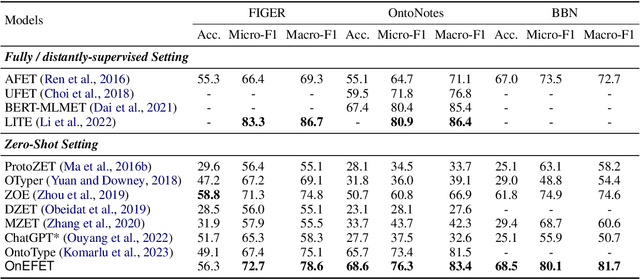Pranav Pillai
Dialog Flow Induction for Constrainable LLM-Based Chatbots
Aug 03, 2024



Abstract:LLM-driven dialog systems are used in a diverse set of applications, ranging from healthcare to customer service. However, given their generalization capability, it is difficult to ensure that these chatbots stay within the boundaries of the specialized domains, potentially resulting in inaccurate information and irrelevant responses. This paper introduces an unsupervised approach for automatically inducing domain-specific dialog flows that can be used to constrain LLM-based chatbots. We introduce two variants of dialog flow based on the availability of in-domain conversation instances. Through human and automatic evaluation over various dialog domains, we demonstrate that our high-quality data-guided dialog flows achieve better domain coverage, thereby overcoming the need for extensive manual crafting of such flows.
Ontology Enrichment for Effective Fine-grained Entity Typing
Oct 11, 2023



Abstract:Fine-grained entity typing (FET) is the task of identifying specific entity types at a fine-grained level for entity mentions based on their contextual information. Conventional methods for FET require extensive human annotation, which is time-consuming and costly. Recent studies have been developing weakly supervised or zero-shot approaches. We study the setting of zero-shot FET where only an ontology is provided. However, most existing ontology structures lack rich supporting information and even contain ambiguous relations, making them ineffective in guiding FET. Recently developed language models, though promising in various few-shot and zero-shot NLP tasks, may face challenges in zero-shot FET due to their lack of interaction with task-specific ontology. In this study, we propose OnEFET, where we (1) enrich each node in the ontology structure with two types of extra information: instance information for training sample augmentation and topic information to relate types to contexts, and (2) develop a coarse-to-fine typing algorithm that exploits the enriched information by training an entailment model with contrasting topics and instance-based augmented training samples. Our experiments show that OnEFET achieves high-quality fine-grained entity typing without human annotation, outperforming existing zero-shot methods by a large margin and rivaling supervised methods.
 Add to Chrome
Add to Chrome Add to Firefox
Add to Firefox Add to Edge
Add to Edge